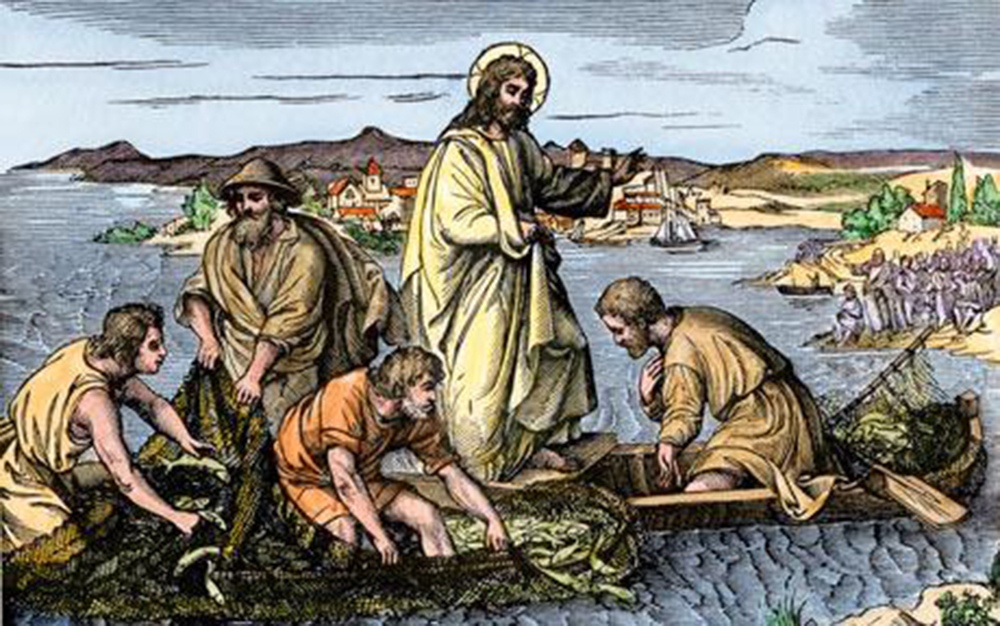Wise Pastors Respect Lay Talent
 Respect in the Church—a Two-way Street
Respect in the Church—a Two-way Street
Today’s post is more personal than usual. In this case, I think my unique life experiences have something to say to the whole Church.
I grew up in an intricate web of pastors’ families—my father, numerous uncles, all of their wives, and grandparents going back to the 17th and 18th century boats that brought us here work in ministry. There are a few denominations represented at our family reunions these days. Mixed marriages.
I am content to be a layperson. The forefather of my denomination, Martin Luther, saw laity and clergy as being of equal importance. Perhaps we need a reminder.
As a family member of all these pastors, I grew up listening to clergy. Ministerium meetings were held at our breakfast table, so my infuences went beyond family. In my professional life, I worked with lots of pastors from three major denominations. I am comfortable in both worlds.
My father always served small churches in rural areas and small towns. His first two parishes were in very rural, Bible-belt Pennsylvania. My parents went there as newlyweds. I lived there to the age of four and am blessed with an unusually good memory for my early childhood.
His parishioners were seasoned Christians accustomed to being responsible for their congregations and working with young pastors starting out and older pastors nearing retirement—the lot of most small churches. They were farmers and thought nothing of rising early for 4 am Bible Society meetings. Some work is best done before the cows are let out.
My parents admired them. “Think how smart you have to be to farm,” my Dad would say. “You have to know a lot of science—nutrition, botany, insects. husbandry, genetics, medicine, weather, chemistry, and technology. You have to know about construction, business, marketing and finance. Farmers rely on community so they must have social skills, too.”
My folks never talked down to any of them. And they grew churches wherever they went.
I was privy to many discussions between professionals. I was often shocked at how some pastors referred to their church members. They often saw them as obstacles to their authority. Their skills were subservient to their own. They had their own lingo. An “alligator” was a lay person lurking in some imaginary water waiting to pull the pastor into the water to devour him limb by limb. Just a tad paranoid! Not surprisingly, they were always fretting about how hard their work was.
More recently, I felt the sting of clergy judgment first hand. Six years of litigation stemmed from a simple disagreement which could have been resolved over coffee had respect in the Church been mutual. But respect was demanded and not returned.
Clergy are used to expressing this dark side in private. They see no harm. They are talking to colleagues, looking for sympathy and support. In this unquestioning environment, and with no way to verify claims, attitudes spread and bad things result.
Imagine what happens when these attitudes of superiority advance with pastors as they climb the hierarchical ladder.
For example, here’s a link from a pastor who has some good things to say. He’s not from my denomination so I don’t really know much about him. I was immediately struck by two things. He started his post by mocking a parishioner. This clouded my vision a bit for the second thing I noticed. He was giving good advice.
I had to overcome the “put down” in order to hear him. I think that is often the problem in the Church that relies so heavily on maintaining clergy and lay division of labor.
Why was it important to depict the lay person as uneducated? Was he trying to connect somehow?
Once a pastor views a parishioner as a double negative-spouting oaf, he just might fail to hear what the parishioner is saying—just as I had to work to read the rest of his post. That lay person’s counsel might have been spot on. He might even have been in agreement. He may have simply needed to be drawn out a bit. In a perfect world, he would have spoken more eloquently—if less effectively as a sound byte.
“Pastor, I have a concern. I suspect other members, whom I know very well, have the same concern. We hear what you are saying, but we worry that you are asking us to do things for which we have no experience or training. When you are gone we might not have the leadership to continue. We’ll end up feeling like failures. It’s a little scary, Pastor. I’m afraid your ideas will run off good members. We will be worse off than we are now. Let’s talk about this some more. Maybe we can find a better way—something we can start by taking smaller steps to build our confidence.”
But here’s a bigger problem for clergy and laity in the modern world.
NEWS FLASH! Discussions online can be read by anyone. You might be writing for pastors, but lay people might be out there googling the same key words. If there were no reasons to watch how you talk about church members before the internet, there is now.
Lay people are smart. They are diverse in their experience and knowledge. They are looking for places to serve where their efforts will be respected. Sadly, this causes many to leave the Church.
Clergy still hold tremendous power over congregations. Clergy gossip weakens that power. What clergy see as a cute, inside joke can do damage.
Granted, clergy have special skills. They worked hard to get them. They deserve respect. Like everyone, they feel unappreciated at times. But these skills mean little without the skills lay people bring as gifts to the altar.
We deserve respect, too.
My folks lived in awe of the farmers that empowered them in the early days of their ministry.
I wonder if that’s why Christ turned to the fishing communities of Galilee. They had to be smart people, too. They had to know weather and sailing, shipbuilding, net sewing, sea life, marketing and . . . . .


Elitist attitudes among clergy toward parishioners are merely a reflection of attitudes in the larger American culture especially in academia, government, and media. These gatekeepers are losing power and influence because the walls to access to knowledge are coming down. And when the formerly powerful begin to lose power, it can get ugly real fast.